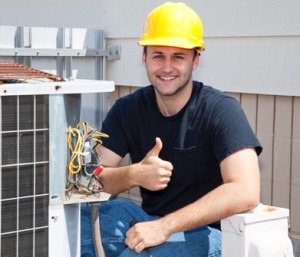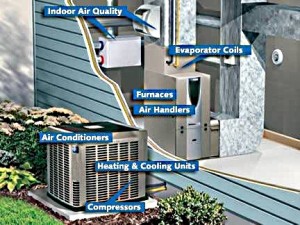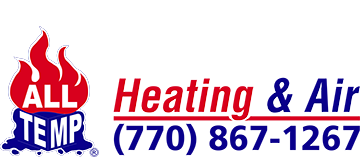What you Need to Know About Your HVAC & Your Brand

All Temp offers sales and services for all brands of HVAC equipment. We offer quality equipment at competitive prices and provide the best customer service in the business.
What about brands?
HVAC equipment is available under hundreds of brand names. You can probably name several brands that you remember from a TV, radio, or billboard advertisement. Although there are many HVAC brand names, HVAC components (compressors, motors, valves, coils, etc.) are typically from a few manufacturers. Comparing HVAC equipment in an “apples-to-apples” match up, you will find many HVAC equipment brands are equal. Even experienced HVAC service technicians would have difficulty identifying specific brands of equipment if the covers and ID plates were missing. Equipment brand name is NOT the most important factor when choosing your HVAC.
The most important HVAC factor is the company you will trust to INSTALL, SERVICE, & WARRANTY your new equipment. Read more…
What can I expect from All Temp?
There are no high-pressure or commissioned-based sales people at All Temp. We are focused on evaluating your individual HVAC need and designing the best systems to accommodate your budget. All Temp Heating and Air Conditioning has been in the HVAC business for over 25 years. All Temp’s technicians and sales staff experience combined yields over 100 years of HVAC industry knowledge. Read more…
Give us a call today at 770-867-1267.
The All Temp team is looking forward to helping you with your HVAC.
What is HVAC?
What does HVAC mean? It stands for Heating, Ventilation and Air Conditioning. It’s an umbrella term that covers all of the different kinds of products used to heat and cool homes. One of the most significant investments you can make in your home, your HVAC system impacts both your indoor comfort and your wallet. In fact, HVAC systems typically make up about half of your energy bill.
How does my HVAC system work?
Controlling the air temperature and humidity in your home and maintaining high air quality are the basic functions of all HVAC systems. But how?
There are several types of HVAC systems that you may choose from to achieve these results. Some systems are more effective than others, depending on the climate where you live. Let’s look at how several different types of HVAC systems work.
What is a split air conditioning system?
Why is it called a “split” air conditioning system? Because it has components that are located inside and outside the home—it’s literally split into two pieces. You may have also heard it referred to as “central air.” Read more…
What is a mini-split/ductless system?
As you likely gather from its name, a mini-split/ductless system is a split system, which means it has components that are located inside and outside the home. However, unlike traditional split HVAC systems, it does not rely on air ducts to route air throughout your home. A mini-split/ductless system is designed to heat or cool a single room, a zone or an addition to your home that may lack or cannot accommodate ductwork. Read more…
What about a furnace?
When you hear the word furnace, you may initially think of old technology like the large “gravity fed” furnaces of the early 20th century. But in modern, forced-air HVAC systems, furnaces feature far more advanced technology and play a larger role in your indoor comfort year-round. Read more…
What about a heat pump?
A heat pump, when matched with an air handler, is an excellent alternative for both heating and cooling your home. Just think of a heat pump as a heat transporter, extracting warm air from your home during the summer, and reversing operation to bring warm air in during the winter. Though it may be difficult to believe that there’s enough warmth in outdoor air during the winter to heat your home, there is actually enough heat energy present in 32 degrees Fahrenheit air to keep you warm and toasty inside. However, in colder climates, a supplemental heat source may be required. Read more…
What about the thermostat?
A thermostat for your home’s HVAC system can range from very basic and functional to extremely sophisticated and feature-rich. Generally speaking, the thermostat controls the operation of your entire HVAC system and provides precision temperature regulation. Newer digital, programmable thermostats, feature both comfort- and efficiency-enhancing functionality.
For example, programmable thermostats may be set to optimally regulate the temperature in your home, based on your schedule and daily routine. Many offer precise humidity control, the ability to vary the temperature in various zones of your home, and advanced monitoring capabilities. Some programmable thermostats even allow for the remote control of your HVAC system via wireless devices.
How much energy does an HVAC system use?
The energy consumption of your HVAC system depends on its efficiency, the area of the country in which it’s being installed, and the kind of fuel the system will be using. This can also make costs vary.
Energy consumption for an HVAC system is determined by several contributing factors, the most influential among them being: the efficiency of system components, whether or not the system is appropriately sized for your home, the climate where you live, and what you or your family consider ideal indoor comfort.
Start by examining some industry-standard efficiency rating systems (SEER, AFUE, HSPF) and which are the most important when evaluating an HVAC system component and its expected energy consumption over time.
What is SEER?
Seasonal Energy Efficiency Ratio or SEER measures the cooling efficiency of air conditioner or heat pump systems. Higher SEER equates to greater efficiency and energy savings. Federal law mandates a minimum 13 SEER rating in new cooling units. Daikin offers air conditioning systems with up to a 24 SEER rating.
WHAT IS AFUE?
Annual Fuel Utilization Efficiency or AFUE is a rating system for gas or oil furnaces, which indicates how much fuel is used to actually heat your home and how much is wasted. Expressed in percentages, a higher AFUE rating translates to greater efficiency and lower fuel costs. So for a 90% AFUE furnace, just 10% of its fuel consumption is lost. Furnaces manufactured in the United States are required to have at least an 80% AFUE.
WHAT IS HSPF?
Heating Seasonal Performance Factor or HSPF rates the efficiency level of the heating mode of heat pumps. Higher-rated heat pumps afford greater efficiency and cost savings. A minimum of 7.7 HSPF is required from new heat pumps.
How is my HVAC efficiency measured?
Electricity is measured and sold by wattage. Measure the amount of electricity that your heating, air conditioning and ventilation system will use in meeting your indoor comfort needs. Typically measured in kilowatt hours, the same units that your electricity company uses to charge you for energy consumption, wattage can vary depending on what “speed” your system is running. For two-stage and multi-stage (i.e., variable speed, inverter or modulating) pieces of equipment, the system can use a much lower amount of wattage when running at low speeds than high speeds. Wattage will be a key component of your operational costs for running an HVAC system, especially since your unit only needs to operate at its peak capacity on some of the hottest or coldest days per year. In everyday operation, the HVAC system requires only a portion of its capacity, which can be delivered more cost by multi-stage units.
It is wise to consider energy usage and efficiency in purchasing a new HVAC system. While more energy-efficient units may cost more upfront, these units will more than pay for themselves in cost savings over time. Ask All Temp to help educate you on the associated energy usage of the system you are installing.
The size of your HVAC system in relation to your home can have a dramatic impact on energy usage. If the system’s too large, it will be forced to work overtime with less efficiency and ultimately result in a shorter life span. The appropriate matching of system components, especially in a split system, can impact energy consumption.
What is the right HVAC system for my needs?
For most individuals, selecting an HVAC system is not something you can do with much confidence. That’s why it’s wise to get some expert advice from All Temp.
There are many factors to consider: size and age of your home, number of rooms in your home, local utility costs, utility incentive and rebate programs, upfront cost difference and long-term financial benefits of upgrading to a higher-rated system, warranties available and type of HVAC system. The All Temp Heating and Air Conditioning pros are specially trained to carefully consider all of these factors, as well as your personal preferences, when recommending an HVAC system. Allow All Temp to help you determine initial cost, warranty protection, service options, maintenance options and operating cost, as well as providing proper installation.
What size and capacity do I need for my HVAC system?
This is an area where the expertise of All Temp is invaluable. You don’t want to invest in an HVAC system that’s too small to do the job. Nor do you want an oversized system that will cycle on and off frequently and never reach peak operating performance—not to mention cause unnecessary wear and tear on system components.
All Temp will assess realities such as relative humidity levels, the number of windows, total square footage of your home, the direction your home faces, the number of heat-producing appliances in your home, your home’s insulation type, even the number of people that live in your residence. With all of these factors determined, All Temp will help you make an informed decision that matches your exact needs and that will pay dividends in the long run.
Can I get a tax rebate or a utility rebate to pay for a new HVAC system?
The federal tax incentives for HVAC expired at the end of 2013. There are local, utility, state and other incentive programs to help fund the purchase of a high-efficiency system. A leading resource to check on these incentives (Database for State Incentives for Renewables and Efficiency) is hosted by North Carolina State University, with the support of the U.S. Department of Energy and can be found at http://dsireusa.org/. The website covers high-efficiency HVAC grant, subsidy, loan and other support programs.
What are typical problems my HVAC system may have?
While today’s HVAC systems are built to deliver years of dependable service, inevitably problems with air conditioning ranging from the simple to the complex can and will arise. Here are several of the most common issues reported by homeowners and our HVAC service professionals:
Dirty Air Filters
Air filters should be changed regularly. Otherwise airflow can be reduced significantly, which can cause your HVAC system to underperform and eventually freeze.
Clogged Drain Lines
A common problem caused by dirt and other organic materials building up in the lines, this can cause water to back up in and ultimately overflow the drain pan—potentially damaging system components.
Blown Fuses
If your HVAC system isn’t working, a breaker could have flipped off. Fuses are designed to protect your unit’s motor and compressor from overheating. A blown fuse may be a sign of a larger problem with your system.
Low Refrigerant
Whether in the lines or in the coils, refrigerant leaks are often caused by system vibration during operation. If your system’s refrigerant requires recharging, you have a leak that requires repair.
Dirty Condenser Coils
Located outside the home and exposed to the elements, condenser coils should be cleaned yearly. Failure to do so can negatively impact system performance.
Electrical Problems
Faulty wiring or worn contactors can be the cause of system outages and should be checked periodically.
Frozen Evaporator Coil
Obstructed air returns or clogged air filters can restrict airflow and cause the evaporator coil inside your home to freeze up. Low refrigerant level can also cause this problem.
Thermostat
These control devices can stop working and require replacement. You can also inadvertently turn them off or not have them on the correct setting for the season or your indoor comfort preference.
How do I maintain my HVAC system?
Like any other piece of machinery, HVAC systems require periodic servicing to ensure proper performance and the unit’s longevity. There are routine maintenance tasks that practically any homeowner can perform, and there are more sophisticated, scheduled maintenance measures that most homeowners should leave to a licensed HVAC professional. We recommend having your system professionally serviced twice a year, ideally in the spring and fall before peak usage seasons. Read more…
